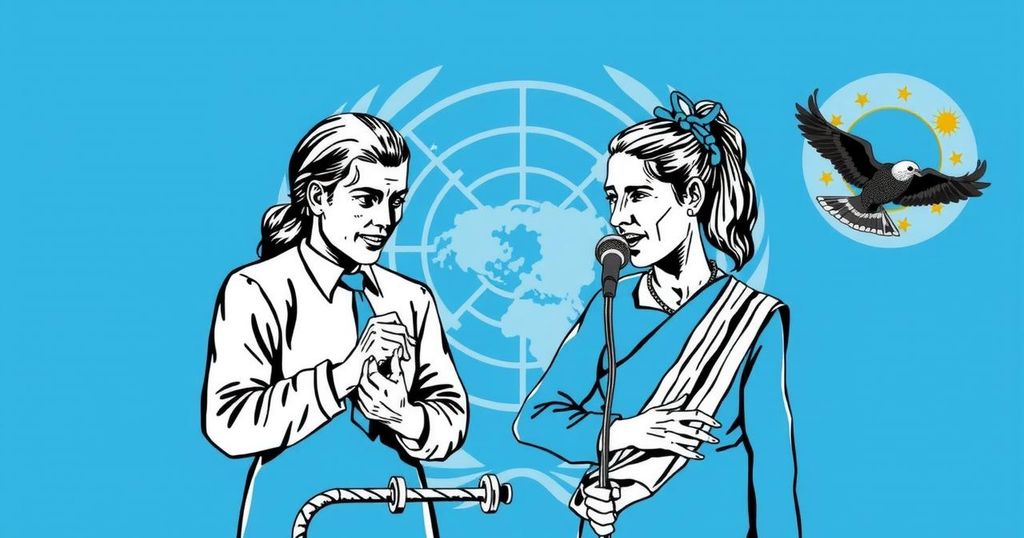Global news
Politics
ARGENTINA, ASIA, AZERBAIJAN, BAKU, DEMOCRACY, EUROPE, EUROPEAN UNION, FOREIGN POLICY, GROUP OF 20 NATIONS, INTERNATIONAL RELATIONS, ISRAEL, LOUSTEAU, MA, MARTIN LOUSTEAU, MILEI, NETHERLANDS, RICHARD SANDERS, SANCTIONS, SOUTH, SOUTH AMERICA, STATE DEPARTMENT, U. N, UN, UNION CIVICA RADICAL, UNIÓN CÍVICA RADICAL, UNITED NATIONS, WOODROW WILSON INTERNATIONAL CENTER FOR SCHOLARS
Isaac Bennett
0 Comments
Argentina Stands Alone at UN Voting Against Gender Violence Resolution
Argentina has become the sole nation to vote against a U.N. resolution denouncing gender violence, signaling a significant policy shift under President Javier Milei. This move has attracted widespread political condemnation and reflects a broader trend of isolationism and alignment with far-right ideologies. Critics warn that Milei’s stance threatens Argentina’s progressive legacy and relationship with international communities.
In a startling decision at the United Nations, Argentina, typically seen as a progressive nation, cast the sole vote against a nonbinding resolution aimed at combating violence against women and girls. This unexpected stance occurred under President Javier Milei, whose administration has exhibited a series of dramatic foreign policy shifts aligning more closely with the United States and Israel. The non-controversial resolution, supported by most countries, was drafted by France and the Netherlands, but Argentina’s rejection incited widespread condemnation across the political spectrum. Milei’s administration represents a significant departure from Argentina’s historic foreign policy, which historically linked the country with the Global South. Critics from various political backgrounds, including the former president’s conservative party and the centrist Unión Cívica Radical, lamented the vote as a disgraceful act of isolationism. Such actions reveal Milei’s strategy to embrace more radical views that often prioritize ideological positions over progressive commitments, raising alarms about the potential regression in social rights previously achieved in the nation. Additionally, this vote follows other controversial measures taken by Milei, such as withdrawing Argentina’s representation from the UN climate summit and disbanding initiatives designed to combat discrimination and promote women’s rights domestically. His government appears intent on establishing an identity on the global stage that aligns with far-right ideologies, akin to those espoused by former U.S. President Donald Trump. This shift has implications for Argentina’s foreign relations, particularly with other nations in the Global South, where public sentiment favors cooperation and collective action against systemic issues like gender violence. Moreover, Milei’s presidency has generated turbulence within diplomatic circles, evidenced by the dismissal of key officials who disagreed with his policies and the forced resignations of diplomats who opposed his confrontational rhetoric. Argentine lawmakers from the left-leaning Peronist movement expressed deep concern over the potential erosion of social rights, such as the legalization of abortion, while others criticized Milei’s disdain for climate action initiatives. The results of these policies and the growing isolation of Argentina are poised to redefine the nation’s role in international affairs, potentially jeopardizing hard-won social advancements. President Milei’s emphasis on individual freedoms appears paradoxical when juxtaposed with his dismissive rhetoric regarding fundamental social issues, such as gender violence and climate change. Observers predict that his administration’s radical departures from established Argentine policies may result in significant social and political consequences in the years ahead.
The recent U.N. vote by Argentina symbolizes a critical shift in the nation’s foreign policy under President Javier Milei, who has adopted a markedly right-oriented approach. Historically, Argentina has been a vocal member of the Global South, advocating for social justice and equity. The resolution against gender violence, promoted by other nations, reflects a broad international consensus on the necessity to combat such issues. Milei’s rejection of this position not only contradicts Argentina’s past commitments but also raises concerns over its future international relations and domestic policies related to women’s rights and climate change, affecting the country’s longstanding social progress.
The recent decision by Argentina to vote against the U.N. resolution aimed at combating gender violence marks a significant shift in the country’s foreign policy under President Javier Milei. This move has attracted substantial criticism across the political spectrum, revealing deepening fractures within Argentina’s social fabric. The implications of such foreign policy changes are profound, threatening to undermine essential social rights and isolate Argentina from global partnerships vital for addressing pressing issues. As Milei continues to align with far-right ideologies, the consequences for Argentina’s domestic policies and international relations remain to be seen.
Original Source: apnews.com




Post Comment